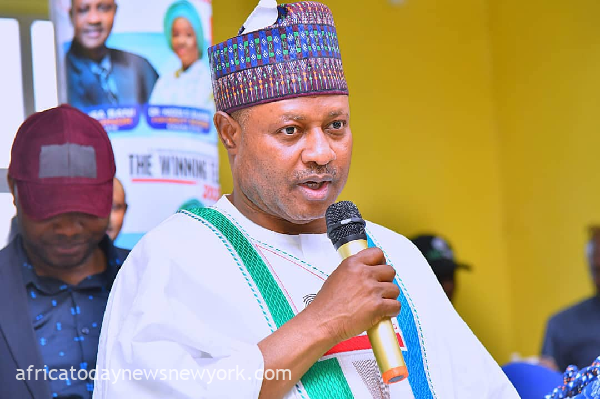Uba Sani, the Governor of Kaduna State, expressed dismay on Saturday over the substantial financial liabilities he inherited from the previous administration upon assuming office on May 29, 2023.
Sani disclosed that the state’s coffers are now depleted, leaving insufficient funds to cover salaries. The governor conveyed this during his address at a Town Hall Meeting held at the late Umaru Musa Yar’Adua Hall in Kaduna.
Additionally, he stated that his administration was bequeathed a cumulative sum of $587 million, N85 billion, and 115 contractual obligations by the former governor.
However, he stressed that his administration abstained from borrowing over the past nine months, drawing attention to how the massive debt encumbrance was depleting the state’s Federal Allocation.
He underscored that the escalation in the exchange rate translated to his administration repaying nearly triple the amount borrowed during Nasir El-Rufai’s leadership.
According to him, N7bn out of the N10bn Federal Allocation for the state in March was used to service debt.
The governor stated further that the state was left with N3 billion, an amount which he said was not enough to pay salary as the state monthly wage bill stands at N5.2bn.
Read also: Gumi Berates Use Of Force On Kidnappers Of Kaduna Pupils
He, however, assured the people of the state that his administration remained determined in steering the state towards progress and sustainable development, as the government has conducted a thorough assessment of the situation and was sharpening its focus accordingly.
He said, “Despite the huge debt burden of $587m, N85bn, and 115 Contractual Liabilities sadly inherited from the previous administration, we remain resolute in steering Kaduna State towards progress and sustainable development. We have conducted a thorough assessment of our situation and are sharpening our focus accordingly.
“It gladdened my heart to inform you that despite the huge inherited debt on the state to date, we have not borrowed a single kobo.
“The key priority areas of our government include safety and security, housing, education, healthcare, and support for Micro, Small, and Medium Enterprises (MSMEs). We are also prioritising inclusive development by investing in human capital, stimulating the economy, and providing affordable housing.”
Touching on security, he highlighted the state’s efforts in revitalizing the Vigilance Service, pointing out the recruitment of 7,000 additional personnel as a significant step forward. Additionally, the acquisition of 100 operational vehicles and 100 motorcycles reflects a commitment to providing necessary resources for both the KADVS and federal security agencies operating within the state.
In his remarks on education, the governor highlighted the implementation of diverse strategies to tackle skills deficiencies within the state. Alongside the creation of multiple skills and vocational cities, he emphasized the collaborative endeavor with Kuwait to decrease the number of out-of-school children in Kaduna by 200,000.
For infrastructure, the governor also said that despite the numerous challenges confronting the state, “our collective efforts are essential for Kaduna State’s progress. We aspire to make rural living enjoyable and transform Kaduna into a premier business hub. Our ultimate goal is to rebuild trust and foster peace and harmony.”
Adding to the discourse, former Chief of Defence Staff, Gen. Martins Luther Agwai (retd.), emphasized the necessity for collaborative endeavors in addressing the security dilemmas plaguing the state. He underscored that without peace and security, the prospects for meaningful development in the state remain elusive.
Reflecting on his earlier comments, the Emir of Zazzau, Ahmad Bamali, voiced confidence in the governor’s ability to rejuvenate the state’s economy amid existing challenges. He remained hopeful that the governor’s leadership could catalyze effective development within the state.

